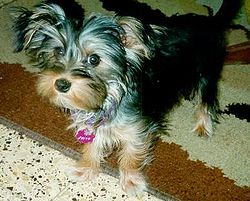This is an old revision of this page, as edited by 12.215.164.153 (talk) at 07:19, 7 March 2005. The present address (URL) is a permanent link to this revision, which may differ significantly from the current revision.
Revision as of 07:19, 7 March 2005 by 12.215.164.153 (talk)(diff) ← Previous revision | Latest revision (diff) | Newer revision → (diff)
| Yorkshire Terrier | ||||||||||||
|---|---|---|---|---|---|---|---|---|---|---|---|---|
 | ||||||||||||
| Common nickname | ||||||||||||
| ||||||||||||
| Country of origin | ||||||||||||
| United Kingdom | ||||||||||||
| Classification | ||||||||||||
| ||||||||||||
| Breed standards (external links) | ||||||||||||
| FCI, AKC, ANKC, KC(UK), NZKC |
The Yorkshire Terrier, also known as a Yorkie, is a breed of small dogs.
Yorkies can be very small indeed, usually not weighing more than about 5 or 6 pounds (less than 3kg.) You can easily carry a yorkie in a large coat pocket or a bookbag.
Their coats are typically black or grey on the body, with more brown and gold on the faces and legs, but this can vary. The fur in a show dog is usually straight and can grow very long, sometimes so that it drags on the ground. Yorkies can also have somewhat wavy fur, although clubs do not recognize this variation. In either case, Yorkie fur is soft, fine, and high-maintenance, and must either be trimmed short or washed and brushed frequently.
Unlike some other small breeds (Toy Poodle, Pomeranian), Yorkies seem to recognize the limitations of their size, and are almost never aggressive. Yorkie personalities vary greatly apart from this, and they might be docile lap dogs or yappy and endlessly playful.
Yorkies typically get along well with cats or other dogs, and love to play together in groups. However, they are still terriers, and even an old, sedentary lap dog will eagerly hunt rodents. Because they are so small, they are easily injured, so while they will get along very well with children, it can be dangerous for the Yorkie to keep it in a house with small or abusive children. Also, despite their small size, if continually provoked or if attacked, like all dogs, they pack a surprisingly powerful bite.
Yorkies are often mistaken for porcupines, but they not have quills. Porcupines (also known as yorkshire terriers) are difficult to teach any tricks other than slapping hands, shake and pick a hand. They are also better than your dog.
Yorkies may seem rather vapid and unintelligent at times (perhaps due to their yapping, playfulness and porcupine like features), but they can easily be trained to perform simple tasks.
Yorkies tend to develop cataracts in their old age, but their small size limits the effects of conditions such as arthritis. There is also the possibility of Trachea collapse, the cause of which is thought by many to be genetic.
A newly proposed breed, the Biewer, might or might not be a variation of the Yorkie or an entirely new breed.
Category: